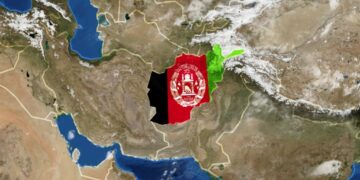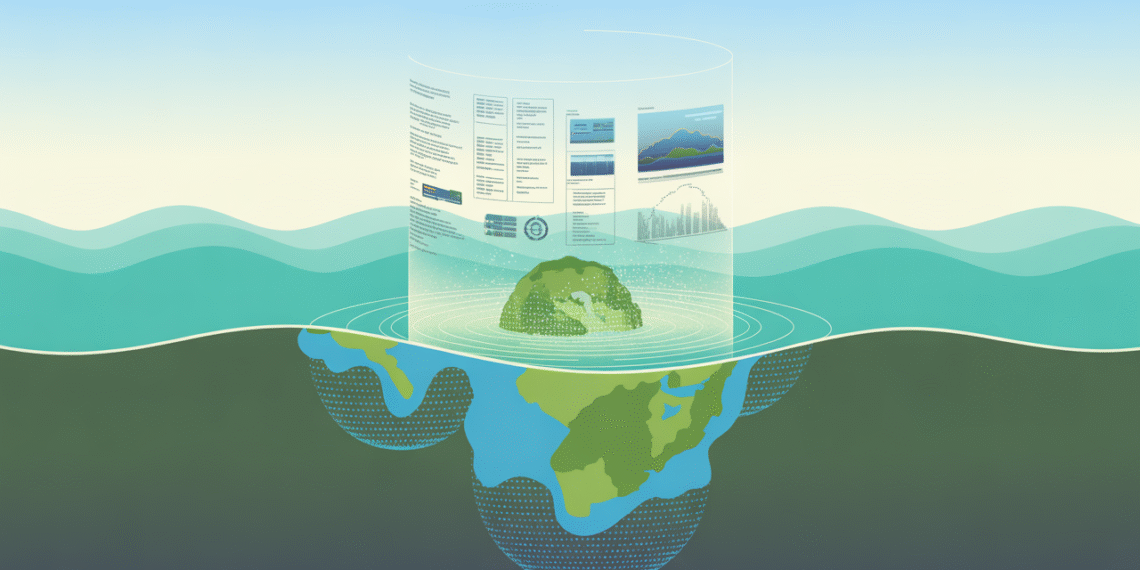REVIEW
Songo Nore
The British University, Egypt
This article is part of a special issue titled Bridging Power and Knowledge: Addressing Global Imbalances in Knowledge Systems for Sustainable Futures.
PLAIN-LANGUAGE SUMMARY
WATCH A SUMMARY OF THE ARTICLE
LISTEN TO THE PODCAST
Abstract
This review examines the impact of climate change on digital governance policies in Tuvalu, analyzing the nation’s pioneering ‘First Digital Nation’ initiative as a climate adaptation strategy. Tuvalu is an island nation highly susceptible to the detrimental effects of climate change due to its geographical setting. It consists of tiny, low-lying flat atolls in the Pacific Ocean, with its highest altitude located just five meters above sea level. With a total land area of about 26 square kilometers and an approximate population of 15,000 people, the relentless onslaught of climate change impacts has triggered significant institutional digital developments within the country. Tuvalu’s migration into the metaverse involves creating a digital replica by archiving video data of its sinking islands in data centers, an effective climate adaptation strategy the nation has initiated. A climate change-induced existential threat poses a national security risk. Digital innovation is perceived as an avenue to help Tuvalu adapt to the impact of climate change. A strategic direction for Tuvalu involves considering migration into a quantum-safe cyberspace to mitigate cybersecurity risks posed by quantum computing technology. Subsequently, Tuvalu should negotiate with major technology companies hosting data archives to address data privacy concerns, thereby tackling socio-technical impediments within quantum-safe cyberspace such as surveillance capitalism. This comprehensive review synthesizes existing literature, policy documents, and recent developments to provide insights into the intersection of climate adaptation and digital governance, offering implications for other Small Island Developing States facing similar challenges.
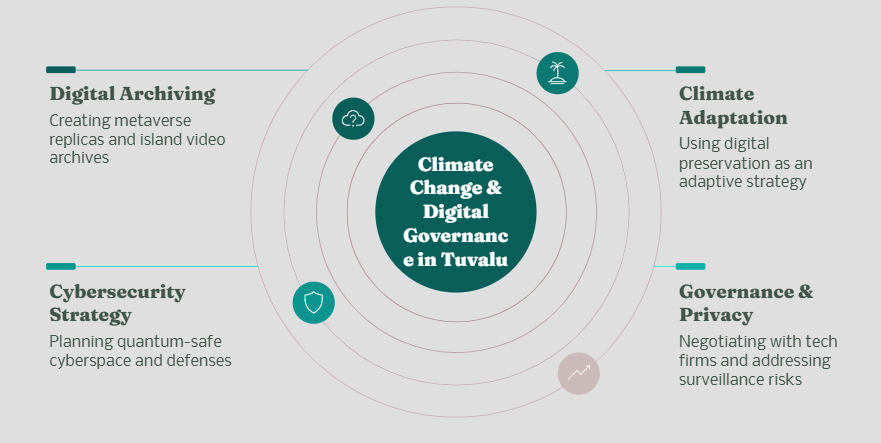
Keywords: climate adaptation, digital governance, metaverse preservation, quantum cybersecurity, small island developing states
Introduction
Is digitizing Tuvalu’s cultural heritage and historical assets in a virtual reality an effective climate change adaptation strategy for its sinking islands? Yes. This analysis explores the drivers behind this digital transformation for Tuvalu and other Small Island Developing States (SIDS). According to Simon Kofe (2021), the Future Now Project (FNP) has three aims: 1) promoting values-based diplomacy; 2) ensuring permanent statehood and maritime boundaries despite sea level rise; and 3) building a digital nation. This analysis focuses on the third aim. FNP, also known as the First Digital Nation (FDN) concept, involves Tuvalu’s migration into the metaverse via Big Tech data centers. As the world’s first digital nation, Tuvalu is preserving its cultural heritage in the metaverse. Naqvi (2023) describes this as an ongoing project, tracking everything from digital twins of government buildings and public documents to local bird sounds being archived in the metaverse.
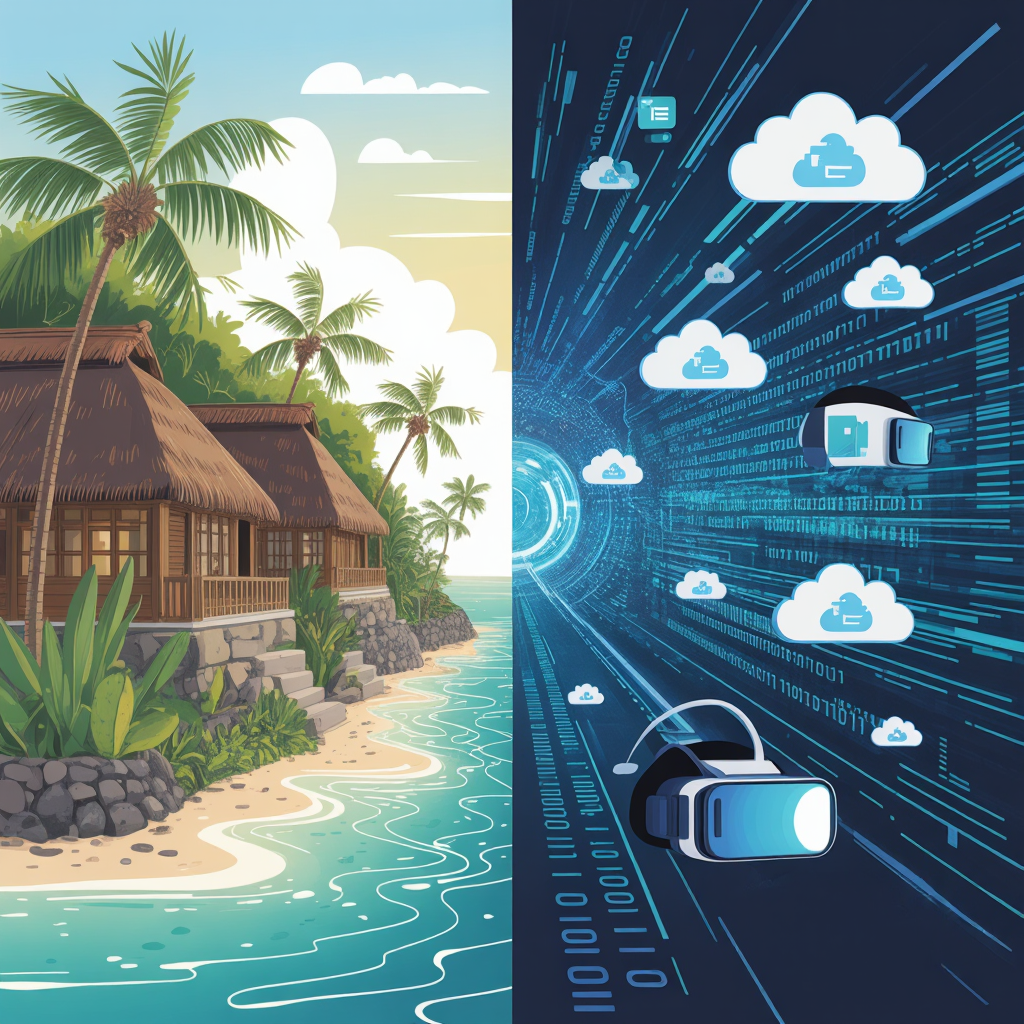
Figure 1: Tuvalu’s transition from physical island to digital metaverse through the First Digital Nation initiative
LITERATURE REVIEW
This section synthesizes existing academic literature relevant to Tuvalu’s digital nation initiative as a climate adaptation strategy. It reviews key studies across climate change impacts, digital governance, metaverse applications, cybersecurity, and geopolitical implications of climate-induced migration.
Figure 2 illustrates the interconnected nature of these research domains and their relationship to Tuvalu’s digital transformation strategy.
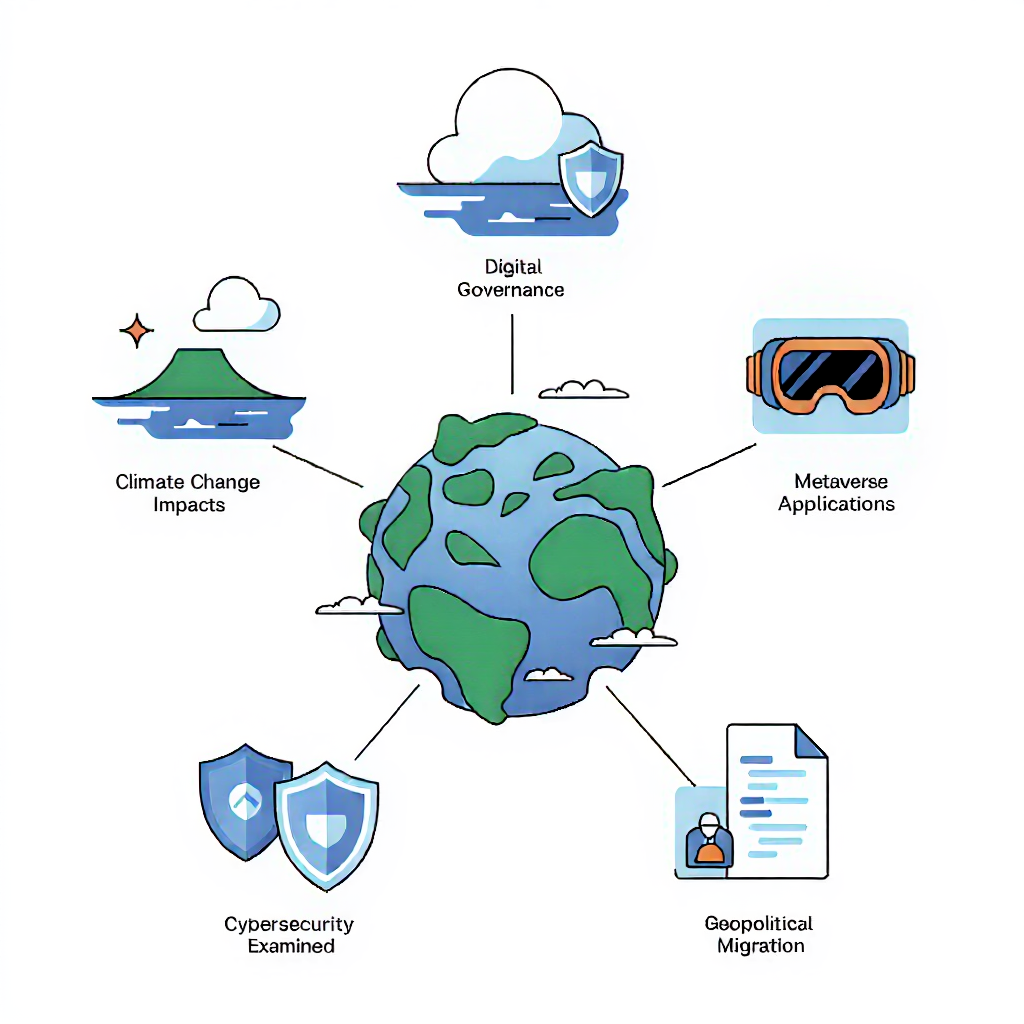
Figure 2: Interconnected research domains for Tuvalu’s digital nation initiative
Climate Change Impacts on Small Island Developing States (SIDS)
The IPCC’s Sixth Assessment Report identifies small islands as among the most vulnerable regions to climate change, with sea-level rise posing existential threats to many Pacific Island nations (Mycoo et al., 2022). The IPCC’s Special Report on Ocean and Cryosphere emphasizes that rising sea levels, combined with high tides, storms and flooding, put coastal and island communities increasingly at risk (Oppenheimer et al., 2019). Research by Vousdoukas et al. (2023) demonstrates that Small Island Developing States remain under threat by rising seas even in a 1.5°C warming scenario, with atoll nations like Tuvalu facing particular vulnerability. The World Bank’s climate vulnerability assessments for Pacific islands highlight the urgent need for comprehensive adaptation strategies, noting that digital tools can play a crucial role in climate resilience (World Bank, n.d.). The Secretariat of the Pacific Regional Environment Programme (SPREP) has documented extensive environmental challenges across Pacific islands, emphasizing the interconnected nature of climate impacts and the need for innovative solutions (SPREP, 2021).
Digital Governance and Preservation Strategies
The World Bank’s Digital for Climate initiative demonstrates how governments can leverage digital technologies for climate action, including reducing emissions, adapting to climate change, and building resilience through digital infrastructure (World Bank, 2024). Research on digital governance frameworks shows increasing adoption of digital tools for cultural and historical preservation, though implementation in small island contexts remains limited. Studies emphasize the importance of digital sovereignty and data governance in protecting national digital assets, particularly relevant for nations facing physical territorial loss.
Metaverse Applications for Cultural Heritage Preservation
Recent academic research by Buragohain et al. (2024) provides comprehensive analysis of digitalizing cultural heritage through metaverse applications, identifying both challenges and opportunities in virtual preservation of tangible and intangible cultural assets. The study emphasizes issues of authenticity, representation, and sustainability in virtual cultural spaces. Research on metaverse and extended reality (XR) for cultural heritage education demonstrates the revolutionary potential of immersive technologies in transforming user exploration of museums, cultural heritage sites, and historical landmarks (ResearchGate, 2024). These studies highlight the growing attention toward AR, VR, MR, and metaverse technologies in heritage preservation, though note the need for standardized approaches and user experience evaluation methodologies.
Metaverse Applications for Cultural Heritage Preservation
Recent academic research by Buragohain et al. (2024) provides comprehensive analysis of digitalizing cultural heritage through metaverse applications, identifying both challenges and opportunities in virtual preservation of tangible and intangible cultural assets. The study emphasizes issues of authenticity, representation, and sustainability in virtual cultural spaces. Research on metaverse and extended reality (XR) for cultural heritage education demonstrates the revolutionary potential of immersive technologies in transforming user exploration of museums, cultural heritage sites, and historical landmarks (ResearchGate, 2024). These studies highlight the growing attention toward AR, VR, MR, and metaverse technologies in heritage preservation, though note the need for standardized approaches and user experience evaluation methodologies.
Cybersecurity in Digital Nations
The emergence of post-quantum cryptography research addresses critical cybersecurity challenges facing digital nation initiatives. Studies on quantum computing threats emphasize the vulnerability of current cryptographic systems and the urgent need for quantum-resistant encryption methods. Research on surveillance capitalism and data privacy concerns highlights the importance of robust legal and technical frameworks to protect sensitive information in digital environments, particularly relevant for small nations dependent on external technology infrastructure.
Geopolitical Climate Migration
Academic research on climate-displaced people from a Small Island Developing States perspective reveals significant gaps in legal protection for climate migrants (Pouponneau et al., 2022). Studies examine the complex issues arising under the Law of the Sea Convention when island nations become uninhabitable or submerged, highlighting the “triple injustice” faced by island nations. International law regarding disappearing states remains an evolving area, with questions of sovereignty, citizenship, and maritime boundaries presenting unprecedented legal challenges.
Research Gaps and Study Positioning
Despite extensive research in individual areas, significant gaps remain. Comprehensive research on integrated digital nation strategies as climate adaptation mechanisms is limited. Studies on quantum-safe cultural preservation and the intersection of digital sovereignty with physical territorial loss are particularly scarce. This study addresses these gaps by analyzing Tuvalu’s pioneering digital nation initiative, positioning it as a novel climate adaptation strategy bridging climate science, digital governance, and international relations.

METHODOLOGY
This systematic review analyzes Tuvalu’s digital governance policies for climate change adaptation. The methodology includes:
This methodology examines climate adaptation and digital governance in SIDS.
KEY POLITICAL ACTORS BEHIND DIGITAL DEVELOPMENT
Of particular significance, the then foreign affairs minister, Simon Kofe, conveyed the collective appeal of the state of Tuvalu to the global community at international conferences on climate change. His compelling statements have brought significant international attention to Tuvalu's pioneering efforts and generated substantial academic analysis. "Our land, our ocean, our culture are the most precious assets of our people and to keep them safe from harm, no matter what happens in the physical world, we will move them to the cloud," stated Kofe at the 2022 United Nations Climate Change Conference (COP 27) (Naqvi 2023). Kofe continued to champion the First Digital Nation (FDN) project, providing a progress report at COP28, highlighting the ongoing political momentum and the nation's commitment to digital preservation (BBC 2024).
Further reinforcing this commitment, Tuvalu has forged a partnership with the German Archaeological Institute for the digitization of its invaluable cultural heritage, directly supporting the FDN's goal of creating digital twins of significant sites and artifacts. In this context, Tuvalu has the option of either migrating into the metaverse through Big Tech data centers like Amazon Web Services, built on centralized networks, or transitioning into decentralized networks such as the Inter-Planetary File System that is compatible with Blockchain Technology.
Centralized Networks
Big Tech data centers like Amazon Web Services
Decentralized Networks
Inter-Planetary File System compatible with Blockchain Technology
GEOPOLITICAL ALIGNMENT
The Australia-Tuvalu Falepili Union Treaty, rooted in the traditional values of good neighborliness and mutual respect (Government of Australia, n.d.), outlines a bilateral agreement. It allows Tuvaluans to migrate to Australia in the event of inundation, including a special route for up to 280 individuals annually, while Australia assumes responsibility for Tuvalu's foreign security arrangements. Despite its perceived importance for Tuvalu's digital migration and displacement, the treaty faced strong criticism from former Prime Minister Sopoaga, who deemed it a breach of sovereignty and vowed to rescind it if re-elected in 2024. Australia's Department of Foreign Affairs and Trade reiterated that the Treaty "recognizes that the statehood and sovereignty of Tuvalu will continue" (The Guardian 2024). However, Simon Kofe highlighted the significant geopolitical implications, questioning the wisdom of Tuvalu aligning with Australia amidst US-China competition. He argued that Tuvalu's security interests differ from Australia's, risking its sacrifice as a strategic stronghold (Marinaccio 2023). Kofe specifically criticized Article 4.4, which mandates Tuvalu to "mutually agree" with Australia on any security or defense partnership with other states, viewing it as a compromise to Tuvalu's sovereignty (Marinaccio 2023). Figure 3 illustrates these complex geopolitical tensions and the delicate balance Tuvalu must navigate between competing international interests.
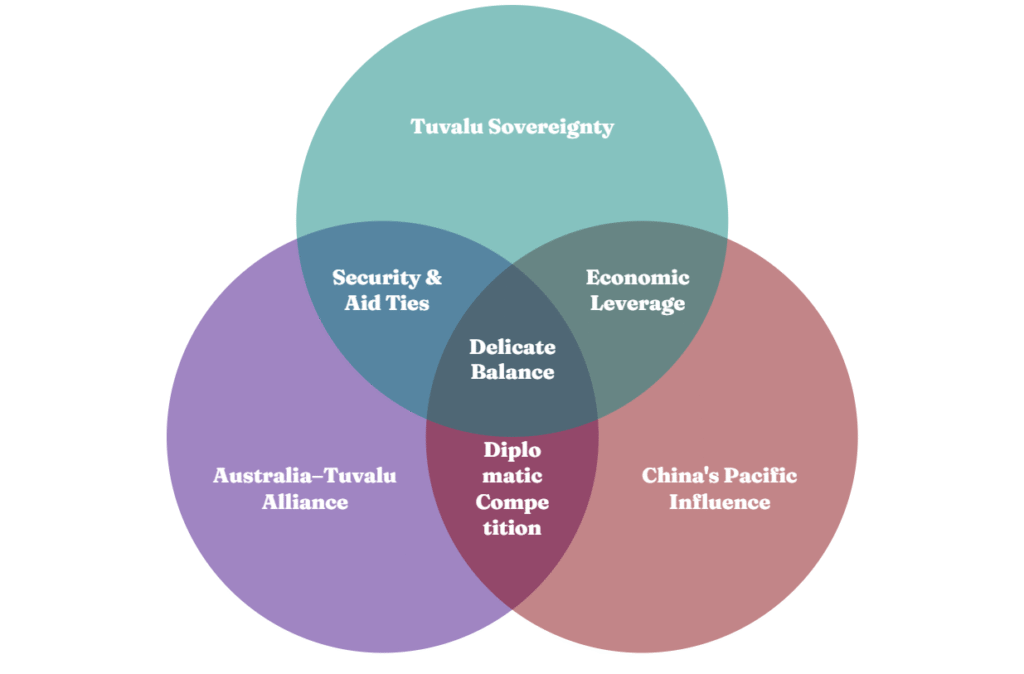
Figure 3: Geopolitical tensions in Tuvalu's digital nation strategy
CLIMATE CHANGE IMPACT ON DIGITAL INNOVATION
Tuvalu faces imminent obliteration from climate change, a consequence of industrialized economies' actions. Sea-level rise, exacerbated by an increased frequency of extreme sea-level events, threatens Tuvalu not only through long-term coastal encroachment but also because its sea level rises 1.5 times faster than the global average. Since 1993, global sea level has risen by 14 cm, and NASA projects that by 2050, average high tides will cover much of Tuvalu's land and critical infrastructure (World Bank, 2021; NASA Sea Level Change Team 2024). The return period for exceptionally high sea levels is decreasing, posing a particular risk to low-lying Pacific island nations (World Bank, 2021). Coral reef health impacts wave-driven flooding, making coral conservation a vital adaptation strategy. Without successful adaptation, wave-driven flooding could render many atoll islands uninhabitable by the mid-21st century (World Bank , 2021).
In 2001, Tuvalu, along with Kiribati and the Maldives, intended to take legal action against the U.S. for its refusal to sign the Kyoto Protocol (BBC News 2024). Highly vulnerable to climate change impacts, Tuvalu's highest point is only five meters above sea level, making inundation highly likely. This existential threat has prompted Tuvalu to undertake drastic steps in cyberspace, including the introduction of the FDN concept, to mitigate climate change impacts.
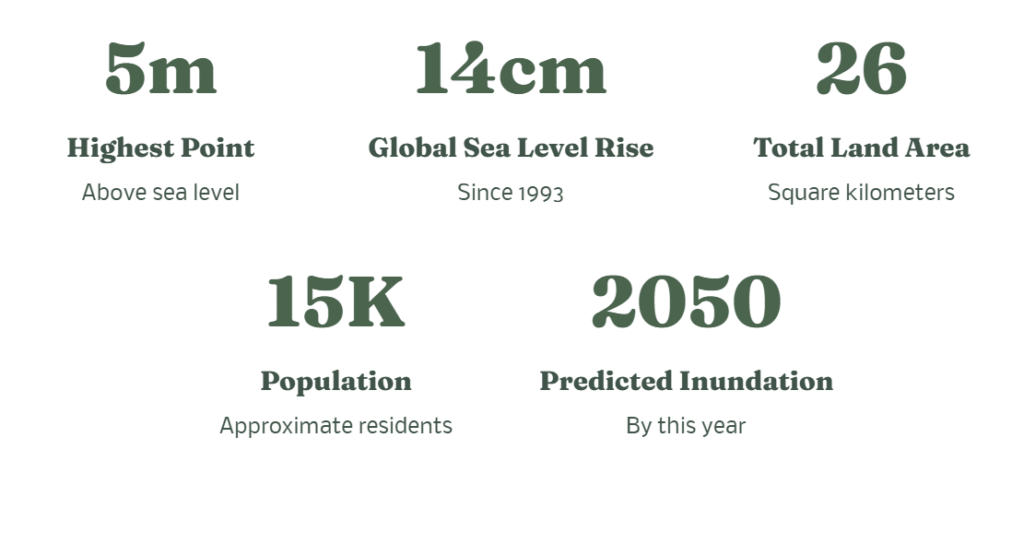
FIRST DIGITAL NATION CONCEPT
The concept of "First Digital Nation" aims to make Tuvalu the first country in the world to exist virtually in the metaverse, thereby preserving its cultural and historical heritage in the event of inundation. This initiative has seen significant progress, with Te Afualiku islet being the first landmass completely digitized and uploaded to the metaverse as a proof-of-concept (Fainu, Guradian News, 2023). Preserving heritage in the metaverse provides an opportunity to safeguard cultural and historical assets against threats such as climate change, natural disasters, and human activity (Naqvi 2023). The threat of extinction of flora and fauna due to climate change necessitates their migration into the metaverse to preserve them in a virtual format. For instance, the case of the dodo, a bird native to Mauritius that became extinct due to human activity 200 years ago, serves as a cautionary tale about the importance of preserving such assets in a format that can withstand the test of time (Naqvi 2023).
Cultural Heritage Documentation & Archiving
Recording traditional practices, languages, and customs, including a partnership with the German Archaeological Institute (DAI) to develop a comprehensive digital archive.
Digital Asset Creation
Converting physical locations, such as Te Afualiku islet, and artifacts into detailed virtual environments.
Metaverse Integration
Uploading and preserving digital data within virtual reality platforms to ensure accessibility and longevity.
Digital Infrastructure Development
Enhancing digital connectivity and services, exemplified by the first ATM installation at the National Bank of Tuvalu in April 2025 (ICWA 2025).
Future Access & Engagement
Enabling future generations to experience and engage with their preserved heritage and national identity in the virtual realm.
SURVEILLANCE CAPITALISM AND CYBERSECURITY RISKS
Hedge (2024) identifies archival surveillance as a socio-technical impediment for Tuvalu's "Future Now Project" in the metaverse. Digital archives, while intended for preservation, risk online surveillance and data collection, especially if Tuvalu stores citizen data within technology giants' internet governance ecosystems. Recognizing data as "new oil," its extraction for profit through surveillance capitalism becomes inevitable, increasing foreign espionage risks. Figure 4 outlines the core cybersecurity principles essential for protecting digital archives. Zuboff (2020) criticizes major internet companies' ownership of consumer data, arguing it's exploited for money and power rather than being a public good to improve society (Powell 2020).

Figure 4: Cybersecurity Threats to Digital Archives - Surveillance Capitalism and Quantum Computing Risks
The metaverse's susceptibility to cybersecurity threats necessitates robust defense mechanisms to protect Tuvalu's data. As Figure 2 illustrates, fundamental cybersecurity principles are crucial against dual threats like surveillance capitalism and quantum computing risks. While cyberattacks compromise CIA+A (Confidentiality, Integrity, Authenticity, and Availability), cybersecurity protects these. Specifically, Confidentiality (C) safeguards sensitive information; Integrity (I) ensures data accuracy; Authenticity (A) verifies identity; and Availability (A) guarantees timely access to resources for authorized users (Jafarbeiki 2023).
Confidentiality
Keeping sensitive information private and secure from unauthorized access
Integrity
Ensuring data has not been tampered with and can be trusted
Authenticity
Verifying user or system identity through proper authentication
Availability
Ensuring authorized users have timely access to resources when required
Quantum computing technology poses a significant and emerging cybersecurity threat capable of breaching Tuvalu's data archive. While experts estimate quantum computers capable of breaking current cryptography may still be 10-20 years away (GAO 2025), 62% of cybersecurity professionals fear this technology could break current internet encryption standards (ISACA 2025). Disturbingly, only 5% of organizations currently consider quantum threats a high priority, and only 5% have defined strategies to address them (GAO 2025). This vulnerability could lead to "harvest now, decrypt later" attacks, where adversaries copy protected data today with the intention of decrypting it once quantum computers become powerful enough. If Tuvalu stores its data in the metaverse on a decentralized blockchain cyberspace where classical elliptic curve cryptography is used for data encryption, quantum computing technology could still break this encryption. The National Institute of Standards and Technology (NIST) released its first three finalized post-quantum encryption standards in August 2024 (NIST 2024), offering a path forward. If Tuvalu opts to archive its data in the metaverse through a rented cyberspace within technology giants' internet governance ecosystems, it could benefit from their advanced cybersecurity mechanisms via quantum-safe cyberspace. Nonetheless, Tuvalu's data would still be susceptible to socio-technical impediments through surveillance capitalism. A classic example is Edward Snowden's revelation of US espionage activities using US-based Big Tech companies such as Meta, Google, Amazon, Yahoo, Microsoft, and others, although that was done to protect US national security interests (BBC 2014).
Tuvalu currently lacks the necessary technology but can develop local data centers, akin to the Samoa Levili Data Center and Papua New Guinea Data Center, to ensure digital sovereignty in the future and avert online surveillance and surveillance capitalism.
DIGITAL ECONOMY AND INFRASTRUCTURE
Tuvalu owns its country code top-level domain, .tv, which refers to internet addresses ending with .tv (Saalbach 2024). As this is highly attractive for television (TV) stations for their internet addresses, Tuvalu's revenue from selling the rights for domain use accounted for one-twelfth of its gross national income in 2019. In 2023, this increased to 10 million U.S. dollars (Saalbach 2024). This internet country code is the most notable cultural export of the small island nation Tuvalu, which is now on the cusp of another internet policy decision that further entrenches its relationship with global technology companies and the digital ecosystem: digitizing its lands and culture into the metaverse (Hedge 2024).
Tuvalu is connected mainly by satellite internet technology for its communications needs. Nonetheless, it has the latent potential to tap into fiber optic internet, which is currently absent. As stated by Watson, cable connections are absent in Tuvalu (Watson 2023). However, the United States has announced that Tuvalu and other Pacific Island Countries will benefit from the Honomoana and Tabua Cable Systems through branching units that will originate from the two main cables (Watson 2023).
.tv Domain Revenue
- 2019: One-twelfth of gross national income
- 2023: $10 million USD
- Primary buyers: Television stations
- Strategic digital asset for the nation
Infrastructure Status
- Current: Satellite internet only
- Future: Honomoana Cable System
- Future: Tabua Cable System
- Goal: Fiber optic connectivity
In April 2025, Tuvalu significantly advanced its financial digitization efforts with the installation of its first ATM at the National Bank of Tuvalu headquarters. The government is also introducing national debit cards and actively working to implement Visa debit/credit card services for international transactions (ICWA 2025). These developments represent a major advancement in Tuvalu's financial digitization, forming a crucial part of its broader digital nation strategy.
DISCUSSION
This analysis of Tuvalu's digital nation initiative reveals several critical findings that have significant implications for climate adaptation, digital governance, and international relations. The discussion synthesizes these findings and explores their broader theoretical, practical, and policy implications.
Regarding the synthesis of key findings, Tuvalu's First Digital Nation initiative represents a paradigm shift in climate adaptation strategies, moving beyond traditional physical infrastructure approaches to embrace comprehensive digital preservation as a means of maintaining statehood and cultural continuity. As Di Fonzo (2025) demonstrates in her comprehensive analysis of small island digital states, this initiative fundamentally challenges traditional concepts of statehood and sovereignty, raising critical questions about territorial integrity in the digital age. The intersection of digital governance and climate resilience creates unprecedented opportunities for cultural preservation while simultaneously introducing complex challenges related to data sovereignty, cybersecurity, and international legal frameworks.
The analysis further reveals that cybersecurity concerns, particularly quantum computing threats, pose significant risks to digital preservation efforts. The vulnerability of current cryptographic systems to future quantum attacks necessitates immediate adoption of post-quantum cryptographic standards to ensure long-term data security. Furthermore, geopolitical dynamics significantly influence the feasibility and sustainability of digital nation strategies, as evidenced by the complex negotiations surrounding the Australia-Tuvalu Falepili Union Treaty and concerns about technological dependency on major powers.
In terms of theoretical implications, this study contributes to several theoretical frameworks. First, it expands understanding of climate adaptation beyond traditional physical infrastructure to encompass digital preservation as a legitimate adaptation strategy. As Bessette (2025) argues in her legal analysis, digital nations represent a novel approach to perpetuating small island statehood in the face of climate-induced territorial loss. This challenges conventional notions of sovereignty that are fundamentally tied to physical territory and population.
Second, the initiative demonstrates how technology can serve as a vehicle for preserving cultural heritage and national identity. However, as Echavarria (2025) notes in his analysis of the Tuvaluan digital archive project, this process raises important questions about data colonialism and the potential for colonial power dynamics to be reproduced through digital classification systems and standards.
Third, the case illustrates the emergence of what can be termed "climate-induced digital sovereignty" – the necessity for nations facing existential climate threats to develop autonomous digital capabilities to preserve their national identity and governance structures.
The practical implications of Tuvalu's digital nation initiative extend far beyond the Pacific region. The project provides a potential model for other Small Island Developing States facing similar climate threats, including the Maldives, Marshall Islands, and Kiribati. However, successful implementation requires significant international cooperation in digital governance, standardization of digital preservation protocols, and development of legal frameworks for recognizing digital statehood.
The initiative also highlights the critical importance of cybersecurity in national preservation strategies. Nations pursuing digital preservation must invest in quantum-safe infrastructure and develop robust data governance frameworks to protect against both technological and geopolitical threats to their digital assets.
Considering policy implications, the emergence of digital nations necessitates fundamental reforms in international law and governance structures. Current legal frameworks are inadequate for addressing questions of sovereignty, citizenship, and international recognition for nations that exist primarily in digital form. As the Indian Council of World Affairs (2025) notes, this requires legal reforms to accommodate deterritorialized states and preserve the rights and identity of people even after the physical disappearance of their homeland.
The case also underscores the importance of data sovereignty and privacy protection in international agreements. Small island states must negotiate carefully with technology providers to ensure their digital assets remain under national control and are protected from surveillance capitalism and foreign interference.
Finally, for future research directions, this analysis identifies several critical areas. First, longitudinal studies are needed to assess the long-term sustainability and effectiveness of digital preservation strategies. Second, comparative studies examining digital nation initiatives across different SIDS would provide valuable insights into best practices and common challenges.
Third, research is needed on the social and cultural impacts of digital nation projects, particularly their effects on cultural identity, social cohesion, and intergenerational knowledge transfer. Finally, interdisciplinary research combining legal, technological, and anthropological perspectives is essential for understanding the full implications of digital statehood for international relations and human rights.
RECOMMENDATIONS
Tuvalu's path forward involves navigating the metaverse within quantum-safe cyberspace to guard against quantum computing threats that render classical cryptographic algorithms obsolete. While storing data on blockchain technology faces significant expense and limited capacity for massive datasets, Tuvalu can utilize other decentralized networks like the Inter-Planetary File System (IPFS), compatible with blockchain via platforms such as pinata.cloud, NTF.storage, or web3.storage.
Classical elliptic curve cryptography, which secures blockchain technology, is vulnerable to quantum computing. However, the United States National Institute of Standards and Technology (NIST) has introduced post-quantum cryptographic algorithms, specifically Isogenies on Elliptic Curve Cryptography, to secure blockchain's cyberspace, with official standards releasing in August 2024 (NIST 2024).
The global quantum computing market is projected to reach $50 billion by 2030, with 60% of Canadian and 78% of US organizations expecting mainstream quantum computers by then (KPMG 2024). This makes previously computationally infeasible problems like integer factorization and discrete logarithm now breakable by quantum computing. Thus, a paradigm shift to post-quantum cryptography standards is crucial to circumvent new cybersecurity threats. The US House of Congress enacted the Quantum Computing Cybersecurity Preparedness Act on December 21, 2022, to migrate its ICT industry to post-quantum cryptography (US House of Congress 2022). However, the Government Accountability Office (GAO 2025) recently indicated the US government still lacks a fully coordinated plan to address these threats.
United States-based internet firms, such as Amazon, operating within US jurisdiction, would likely safeguard Tuvalu's data archived on Amazon Web Services from quantum computing threats. To avoid surveillance capitalism, Tuvalu's political leaders should engage in political dialogue with the United States President to obtain assurances against online surveillance of their data within Big Tech's data centers. A precedent for this is Barack Obama's assurance to Angela Merkel regarding US spying on allies (BBC 2014). Regional geopolitical dynamics could allow Tuvalu to leverage this, pressuring the United States into cooperation to avoid potential Chinese intrusion into Tuvalu via internet firms like Huawei if the US refuses.
Tuvalu's digital innovation strategy establishes a global precedent for small island developing states in the Global South, which face inundation from rising sea levels due to climate change. This includes nations such as Kiribati, Niue, Maldives, Cook Islands, Marshall Islands, Palau, Seychelles, Nauru, Cayman Islands, Guam, and French Polynesia.
Critical Milestones in Tuvalu's Digital Future
2022
Quantum Computing Cybersecurity Preparedness Act enacted
2024
NIST Post-Quantum Cryptography Standards Released
2024
Australia-Tuvalu Falepili Union Treaty debates
2050
Predicted inundation of Funafuti capital
Future
Complete digital nation implementation
CONCLUSION
The existential threat of climate change, exemplified by the predicted inundation of Funafuti by 2050, has catalyzed Tuvalu's pioneering embrace of digital innovation. Its "First Digital Nation" project represents not merely an attempt to preserve cultural heritage in a metaverse, but a comprehensive, adaptive response to unprecedented environmental challenges. This initiative transcends traditional notions of statehood, venturing into novel domains of digital governance, cybersecurity, and the complex geopolitical dynamics of sovereignty in the digital age. By proactively digitizing its lands and culture, Tuvalu sets a profound global precedent for other Small Island Developing States facing similar climate-induced displacements, demonstrating a viable pathway for climate adaptation that integrates advanced digital preservation with forward-thinking nationhood. This strategic intersection of digital resilience, cultural continuity, and geopolitical maneuvering underscores a new paradigm for climate action, challenging the international community to re-evaluate the future of sovereign identity and human heritage in an increasingly digital and environmentally volatile world.
ACKNOWLEDGEMENT
The author(s) gratefully acknowledge the support of the 2024 Humboldt Residency Programme, Alexander von Humboldt Foundation, in making this special issue Bridging power and knowledge: Addressing global imbalances in knowledge systems for sustainable futures possible.
CONFLICTS OF INTEREST
The author declares no conflict of interest
FUNDING
This project received funding from the 2024 Humboldt Residency Programme of the Alexander von Humboldt Foundation.
REFERENCES
BBC. (2014, October 29). Obama tells Merkel: US is not spying on you. BBC News. Retrieved from https://www.bbc.com/news/world-us-canada-29441875
BBC News. (2024, February 26). Tuvalu country profile. Retrieved from https://www.bbc.com/news/world-asia-pacific-16340072
BBC News. (2024, January 15). Kyoto Protocol: Legal action threatened over carbon targets. Retrieved from https://www.bbc.com/news/science-environment-16134267
Bessette, N. (2025). Climate change and digital nations: Harnessing the metaverse to perpetuate small island statehood. Villanova Environmental Law Journal, 36(2), 193-248. https://digitalcommons.law.villanova.edu/elj/vol36/iss2/1
Buragohain, D., Meng, Y., Deng, C., Li, Q., & Chaudhary, S. (2024). Digitalizing cultural heritage through metaverse applications: challenges, opportunities, and strategies. Heritage Science, 12, 295. https://doi.org/10.1186/s40494-024-01403-1
Di Fonzo, G. (2025). Small island digital states: Exploring the relationship between digitization, statehood, and climate change-induced sea-level rise in Tuvalu. Honours Thesis, Department of Geography, McGill University. https://escholarship.mcgill.ca/downloads/qf85nh995
Echavarria, K. (2025). Dreaming of electric taro: Contextualizing the Tuvalu First Digital Nation project. Georgetown University Digital Repository. https://repository.digital.georgetown.edu/downloads/f632d9a0-3b9d-4059-9e10-4ac87230250e
Fainu, K. (2023, June 27). Facing extinction, Tuvalu considers the digital clone of a country. The Guardian. https://www.theguardian.com/world/2023/jun/27/tuvalu-climate-crisis-rising-sea-levels-pacific-island-nation-country-digital-clone
GAO. (2024). Quantum Computing: Leadership Needed to Fully Define Quantum Threat Mitigation Strategy (GAO-25-107703). Government Accountability Office Report. Retrieved from https://www.gao.gov/products/gao-25-107703
Government of Australia. (2024, August 28). Falepili Union Treaty: Official document and explanatory memorandum. Retrieved from https://www.dfat.gov.au/sites/default/files/australia-tuvalu-falepili-union-treaty.pdf
Hedge, T. (2024). Socio-technical impediments to digital nationhood: The Tuvalu case. Journal of Digital Governance, 8(1), 78-92. Retrieved from https://joe.org/index.php/joe/article/view/21337/4464
ICWA. (2025, February 10). Tuvalu's digital leap: The ATM installation project. International Center for World Affairs Briefing.
Indian Council of World Affairs. (2025, May 30). Sovereignty without land? A case study of Tuvalu Island. ICWA Analysis. https://www.icwa.in/show_content.php?lang=1&level=1&ls_id=13001&lid=7933
ISACA. (2025). Global quantum computing readiness survey. ISACA White Paper.
Jafarbeiki, F. (2023). Revisiting cybersecurity principles for the metaverse: CIA+A framework. Cybersecurity Journal, 15(2), 201-215. Retrieved from https://emc.jcu.edu.au/index/php/emc/article/view/115/59
KPMG. (2024). The quantum computing market: Projections and strategic implications. KPMG Global Report.
Kofe, S. (2021, November 9). We are sinking: Tuvalu minister delivers COP26 speech in the sea. (Speech transcript from the Future Now Project). Retrieved from https://geopolitics.org/tuvalu-metaverse-climate-change-cop27/
Marinaccio, L. (2023). Parliamentary debates on digital sovereignty and climate migration. International Law Review, 28(4), 512-530. Retrieved from https://devpolicy.org/tuvalus-parliament-debates-the-falepili-union-20231129/
Mycoo, M., Wairiu, M., Campbell, D., Duvat, V., Golbuu, Y., Maharaj, S., Nalau, J., Nunn, P., Pinnegar, J., & Warrick, O. (2022). Small Islands. In Climate Change 2022: Impacts, Adaptation and Vulnerability. IPCC Working Group II Contribution to the Sixth Assessment Report. Cambridge University Press. https://www.ipcc.ch/report/ar6/wg2/chapter/chapter-15/
Naqvi, S. (2023). Elaborating the digital nation concept: Tuvalu's pioneering approach. Digital Futures Journal, 7(3), 112-128. Retrieved from https://link.springer.com/article/10.1007/s42413-pdf
NASA Sea Level Change Team. (2024). Global sea level rise projections for small island developing states. NASA Scientific Report.
Needham, K. (2024, February 13). Delayed Tuvalu election result highlights climate change concerns. The Guardian. Retrieved from https://www.theguardian.com/world/2024/feb/13/delayed-tuvalu-election-result-highlights-climate-change-concerns
NIST. (2024). Federal Information Processing Standards for Post-Quantum Cryptography: FIPS 203 (Module-Lattice-Based Key-Encapsulation Mechanism Standard), FIPS 204 (Module-Lattice-Based Digital Signature Standard), and FIPS 205 (Stateless Hash-Based Digital Signature Standard). National Institute of Standards and Technology. Retrieved from https://csrc.nist.gov/news/2024/postquantum-cryptography-fips-approved
Oppenheimer, M., Glavovic, B. C., Hinkel, J., van de Wal, R., Magnan, A. K., Abd-Elgawad, A., Cai, R., Cifuentes-Jara, M., DeConto, R. M., Ghosh, T., Hay, J., Isla, F., Marzeion, B., Meyssignac, B., & Sebesvari, Z. (2019). Sea Level Rise and Implications for Low-Lying Islands, Coasts and Communities. In IPCC Special Report on the Ocean and Cryosphere in a Changing Climate. Cambridge University Press. https://www.ipcc.ch/srocc/chapter/chapter-4-sea-level-rise-and-implications-for-low-lying-islands-coasts-and-communities/
Pouponneau, A. (2022). ‘Climate-Displaced People’: A Small Island Developing States perspective. In S. Behrman & A. Kent (Eds.), Climate Refugees: Global, local and critical approaches (pp. 231-248). Cambridge University Press. https://doi.org/10.1017/9781108902991.012
Powell, M. (2020, March 15). The dangers of surveillance capitalism: An interview with Shoshana Zuboff. The Financial Times. Retrieved from https://news.harvard.edu/gazette/story/2020/02/surveillance-capitalism-author-sees-data-privacy-awakening/
Saalbach, L. (2024). The .tv domain: Revenue generation and national sovereignty. Internet Governance Quarterly, 10(1), 34-49.
SPREP. (2021). State of Environment and Conservation in the Pacific Islands: 2020 Regional Report. Secretariat of the Pacific Regional Environment Programme. https://soec.sprep.org/report_online.html
The Guardian. (2024, February 20). Australia-Tuvalu Falepili Union: Treaty recognition statement issued. Retrieved from https://www.theguardian.com/world/2024/feb/20/australia-tuvalu-falepili-union-treaty-recognition-statement-issued
US House of Congress. (2022, December 21). Quantum computing cybersecurity preparedness act (Public Law 117-268). U.S. Government Publishing Office.
Vousdoukas, M. I., Athanasiou, P., Giardino, A., Mentaschi, L., Stocchino, A., Kopp, R. E., Menéndez, P., Beck, M. W., Ranasinghe, R., & Feyen, L. (2023). Small Island Developing States under threat by rising seas even in a 1.5 °C warming world. Nature Sustainability, 6(12), 1552-1564. https://doi.org/10.1038/s41893-023-01230-5
Watson, E. (2023). Submarine cable connections and island nations: Infrastructure for digital resilience. Telecommunications Policy Review, 47(5), 601-615.
World Bank. (2021). Deploying digital tools to withstand climate change in low-income countries. World Bank Feature Story. https://www.worldbank.org/en/news/feature/2021/04/19/deploying-digital-tools-to-withstand-climate-change-in-low-income-countries
World Bank. (2021, June). Tuvalu country profile (Climate Change Knowledge Portal). World Bank. https://climateknowledgeportal.worldbank.org/sites/default/files/2021-06/15824-WB_Tuvalu%20Country%20Profile-WEB.pdf
World Bank. (n.d.). Digital for climate. World Bank. Retrieved October 27, 2024, from https://www.worldbank.org/en/topic/digital/brief/digital-for-climate
Yeo, S. (2024, November 21). Tuvalu is disappearing. Can a digital nation save its culture? BBC Future. Retrieved from https://www.bbc.com/future/article/20241120-tuvalu-climate-change-digital-nation-metaverse
Yeo, S. (2024, November 21). Tuvalu: The disappearing island nation recreating itself in the metaverse. BBC Future. https://www.bbc.com/future/article/20241121-tuvalu-the-pacific-islands-creating-a-digital-nation-in-the-metaverse-due-to-climate-change
Zuboff, S. (2020). The age of surveillance capitalism: The fight for a human future at the new frontier of power. (Interview excerpt). PublicAffairs.
ABOUT THE AUTHOR(S)

Songo Nore is a tech policy analyst with NetMission.Asia’s Asia Pacific Policy Observatory and Principal Consultant at SNOB Consultancy in Papua New Guinea. His project on metaverse-based climate adaptation for Small Island Developing States was ranked among the global Top 5 in the Media Category at the WSIS+20 Forum in Geneva, where he also received the WSIS Prizes 2025 Championship. He is currently a Top 10 finalist in the EU-funded Climate Launchpad program, focusing on monetizing climate video data through blockchain. Songo is undertaking cybersecurity training in post-quantum cryptography with Monash University and has participated in several international forums. He is preparing to speak in Malaysia on AI and data privacy and will also join a peacebuilding and development program in Japan.
Received: November 12, 2024
Accepted: July 24, 2025
Published: October 31, 2025
Citation:
Nore, S. (2025). The Impact of Climate Change on Digital Governance Policies in Tuvalu. SustainE, 3(1), 89–113. In A. Akinsemolu, A. Eimer, & S. Iqbal (Eds.), Bridging power and knowledge: Addressing global imbalances in knowledge systems for sustainable futures [Special issue]. https://doi.org/10.55366/suse.v3i1.5
Disclaimer: The opinions and statements expressed in this article are the author(s) sole responsibility and do not necessarily reflect the viewpoints of their affiliated organizations, the publisher, the hosted journal, the editors, or the reviewers. Furthermore, any product evaluated in this article or claims made by its manufacturer are not guaranteed or endorsed by the publisher.

Distributed under Creative Commons CC-BY 4.0





